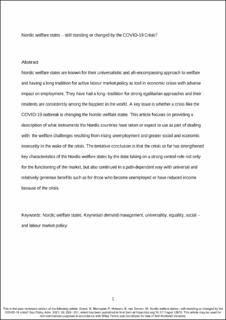Nordic welfare states—still standing or changed by the COVID‐19 crisis?
Peer reviewed, Journal article
Accepted version
Permanent lenke
https://hdl.handle.net/11250/2766544Utgivelsesdato
2020-12-01Metadata
Vis full innførselSamlinger
Originalversjon
Social Policy & Administration. 2020, 55 (2), 295-311. https://doi.org/10.1111/spol.12675Sammendrag
Nordic welfare states are known for their universalistic and all-encompassing approach to welfare and having a long tradition for active labour market policy as tool in economic crises with adverse impact on employment. They have had a long- tradition for strong egalitarian approaches and their residents are consistently among the happiest in the world. A key issue is whether a crisis like the COVID-19 outbreak is changing the Nordic welfare states. This article focuses on providing a description of what instruments the Nordic countries have taken or expect to use as part of dealing with the welfare challenges resulting from rising unemployment and greater social and economic insecurity in the wake of the crisis. The tentative conclusion is that the crisis so far has strengthened key characteristics of the Nordic welfare states by the state taking on a strong central role not only for the functioning of the market, but also continued in a path-dependent way with universal and relatively generous benefits such as for those who become unemployed or have reduced income because of the crisis.
